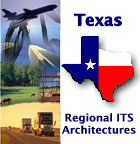

|

|

|

|

|

|

|

|

|

|
City of Sherman Traffic Operations Center Equipment Packages |
 |
The following equipment packages are associated with the "City of Sherman Traffic Operations Center" element. Select the "Details" icon to see the detailed requirements associated with each equipment package, or consult the National ITS Architecture web site for more information.
Management of traffic sensors and surveillance (CCTV) equipment, and distribution of the collected information to other centers and operators.
Remotely monitor and control highway-rail intersection (HRI) equipment, includes standard speed active warning systems and high speed systems which provide additional information on approaching trains and detect and report on obstructions in the HRI.
Collection and storage of maintenance and construction information. For use by operations personnel or data archives in the region.
MCM Environmental Information Collection
![]()
Remotely controls environmental sensors and assimilates collected data with other current and forecast road conditions and surface weather information from weather service providers and transportation operations.
MCM Environmental Information Processing
![]()
Processes current and forecast weather data, road condition information, local environmental data, and uses internal models to develop specialized detailed forecasts of local weather and surface conditions. Disseminates road weather information to other agencies and centers.
Supports coordinated response to incidents - share incident notifications, manage incident response resources, and coordinate overall incident situation and response among allied response organizations.
MCM Maintenance Decision Support
![]()
Maintenance Decision Support Systems recommend courses of action based on current and forecast environmental and road conditions (filtered and fused for specific time horizons) and additional application specific information. Recommendations and dispatch instructions are generated based on this integrated information.
MCM Roadway Maintenance and Construction
![]()
Overall management and support for routine maintenance on the roadway or right-of-way. Includes landscape maintenance, hazard removal (roadway debris, dead animals), routine maintenance activities (roadway cleaning, grass cutting), and repair and maintenance of both ITS and non-ITS equipment.
MCM Winter Maintenance Management
![]()
Manages winter road maintenance, tracking and controlling snow plow operations, roadway treatment (e.g., salt spraying and other material applications) based on weather information.
MCM Work Activity Coordination
![]()
Disseminates work activity schedules to other agencies. Work schedules are coordinated, factoring in the needs and activities of other agencies and adjacent jurisdictions.
Remotely monitors and supports work zone activities, controlling traffic through portable dynamic message signs (DMS) and informing other groups of activity (e.g., traveler information systems, traffic management centers, other maintenance and construction centers).
Coordination between rail operations and traffic management centers - exchanging train schedules, maintenance schedules, as well as incidents and priority messages which result in highway-rail intersection (HRI). Supports advanced traffic control strategies and enhanced traveler information.
Management of environmental sensors and assimilation of collected data with other current and forecast road conditions and surface weather information from weather service providers and roadway maintenance operations.
Development, coordination, and execution of special traffic management strategies during evacuation and subsequent reentry of a population in the vicinity of a disaster or major emergency. Interfaces with emergency management and other traffic management centers.
Remotely controls ramp meters, mainline metering, and lane controls on freeways based on upstream and downstream traffic flow and ramp queue length algorithms.
Remotely controls traffic and video sensors to support incident detection and verification; exchange information with other agencies including emergency management, maintenance and construction, alerting and advisory systems, event promoters, intermodal freight depots, and traveler information systems.
TMC Incident Dispatch Coordination/Communication
![]()
Center-based capability to formulate an incident response that takes into account the incident potential, incident impacts, and/or resources required for incident management including proposing and facilitating the dispatch of emergency response and service vehicles as well as coordinating response with all appropriate cooperating agencies.
TMC Probe Information Collection
![]()
Collects, assimilates, and disseminates vehicle probe data collected from roadside beacons and centers controlling transit vehicles, emergency vehicles, toll collection points, and route-guided vehicles.
Coordination between traffic management centers in order to share traffic information between centers as well as control of traffic management field equipment. This may be used during incidents and special events and during day-to-day operations.
Remotely controls traffic signal controllers to implement traffic management strategies at major intersections and on main highways for urban areas, based on traffic conditions, incidents, emergency vehicle preemptions, pedestrian crossings, etc.
TMC Traffic Information Dissemination
![]()
Controls dissemination of traffic-related data to other centers, the media, and travelers via the driver information systems (DMS, HAR) that it operates.
TMC Work Zone Traffic Management
![]()
Coordination with maintenance systems using work zone images and traveler information systems (such as DMS), and distribution of work plans so that work zones are established that have minimum traffic impact.
Collection and storage of traffic management data. For use by operations personnel or data archives in the region.
Monitoring and remote diagnostics of field equipment - detect failures, issue problem reports, and track the repair or replacement of the failed equipment.
 Web Spinner Technology.
Web Spinner Technology.